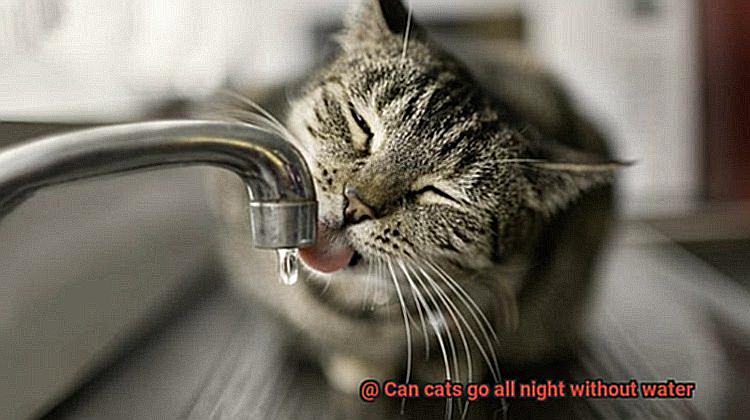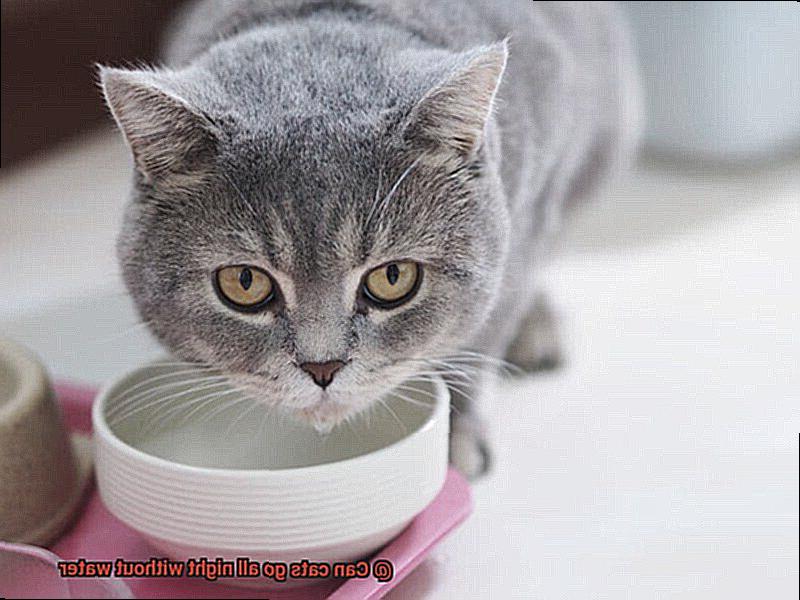As a cat owner, have you ever found yourself questioning whether your feline companion can survive the night without water? It’s a valid concern, especially if you’re planning to be away from home for an extended period. But the answer isn’t as simple as a mere yes or no.
Cats are fascinating creatures with unique bodies that work in mysterious ways. They possess a natural instinct to stay hydrated, but they can also be quite picky about their drinking habits. Some cats prefer to sip water throughout the day, while others may gulp down large quantities at once and go without water for hours.
Whether cats can go all night without water depends on various factors such as their age, health condition, climate, and diet. While young kittens and senior cats require more frequent hydration, healthy adult cats can survive up to 24 hours without water under specific circumstances.
In this blog post, we’ll delve into the science behind a cat’s hydration needs and explore how long they can last without water. We’ll also discuss when you should become concerned about your cat’s water intake. So whether you’re seeking information to ensure your furry friend’s well-being or simply satisfying your curiosity, keep reading to discover just how thirsty your feline friend really is.
What Do Cats Need Water For?
Cats are fascinating and mysterious creatures with a unique relationship with water. Although they may not be big drinkers, water is essential for their health and well-being. In fact, it plays a crucial role in almost every bodily function, from digestion to temperature regulation.
Water helps move food through a cat’s digestive system, allowing nutrients to be absorbed and waste to be eliminated. Without enough water, cats can experience constipation and other digestive issues. It also helps regulate body temperature by cooling cats down through panting and drinking. Dehydration can cause a cat’s body temperature to rise, leading to heatstroke and other serious health issues.
But that’s not all. Water also keeps a cat’s skin and fur healthy and shiny. Cats that do not drink enough water are at risk of developing dry skin and a dull coat. And if that wasn’t enough, water is also necessary for keeping the kidneys functioning properly. Cats that do not drink enough water are at risk of developing urinary tract problems and kidney disease.
So how much water does a cat need? The answer depends on several factors such as size, age, health status, and activity level. A healthy adult cat should drink about 2-4 ounces of water per 5 pounds of body weight each day. It is important to note that while some cats may be able to go without water for a few hours at night, it is not recommended to make this a regular occurrence. Dehydration can lead to serious health problems in cats.
How Much Water Does a Cat Need?

Well, the answer isn’t cut and dried. It depends on various factors, but I’m here to give you the lowdown.
Cats need water to stay hydrated and healthy, just like us humans do. Water plays a vital role in their digestion, regulates body temperature, maintains healthy skin and fur, and ensures proper kidney function.
So, how much water should your furry friend be drinking? On average, cats require 3.5-4.5 ounces (100-130 ml) of water per 5 pounds (2.27 kg) of body weight daily. For instance, a 10-pound (4.54 kg) cat needs around 7-9 ounces (200-260 ml) of water per day.
However, cats are not always great at keeping themselves hydrated. They have a low thirst drive and may not drink enough water to meet their daily needs, particularly if they consume dry food. As a responsible pet parent, it’s essential to encourage your cat to drink more by providing fresh water in multiple bowls around the house and including wet food in their diet.
Dehydration can lead to serious health issues in cats, such as urinary tract infections and kidney disease. To avoid any health concerns, keep an eye out for signs of dehydration in your cat such as dry mouth and nose, sunken eyes, lethargy, and loss of skin elasticity. If you suspect that your cat is dehydrated, ensure that they get adequate water or seek veterinary assistance immediately.
Can Cats Go All Night Without Water?
Well, the short answer is yes, but there’s more to it than that. You see, cats need water to maintain their bodily functions and overall health. While it’s true that cats are known for their ability to survive without drinking water for extended periods, depriving them of water altogether is not recommended.

Factors such as age, weight, health condition, and activity level can impact a cat’s ability to go all night without water. Young kittens, senior cats, and cats with health issues may require more frequent access to water. Additionally, if your cat is active or has a high protein diet, they may need more water than other cats.

It’s also worth noting that cats get most of their hydration from the food they eat. Wet cat food contains a higher percentage of water than dry food, which can help keep your cat hydrated. However, if your cat only eats dry food, it’s vital to provide access to fresh water throughout the day and night.

Dehydration in cats can lead to serious health problems such as urinary tract infections, kidney disease, and even death. So it’s crucial to keep an eye out for signs of dehydration such as lethargy, loss of appetite, dry mouth and nose, sunken eyes, and decreased skin elasticity.
Potential Risks of Letting a Cat Go All Night Without Water
While it may be tempting to assume that your feline friend can go all night without access to hydration, the potential risks of dehydration are too significant to ignore.
Dehydration is one of the most significant potential risks of letting a cat go all night without water. Although cats can technically survive without water for a short period, prolonged dehydration can lead to severe health problems. For instance, it can increase the risk of urinary tract infections, crystals, and kidney stones. Without adequate hydration, your cat’s urine becomes more concentrated, which can cause irritation and inflammation in the urinary tract.
In addition to urinary tract problems, dehydration can also lead to digestive issues and constipation. Proper digestion and bowel movements require adequate water intake. Without it, your cat may experience discomfort and difficulty passing stool.
Chronic dehydration can also put a strain on your cat’s kidneys over time and ultimately lead to kidney failure – a severe and potentially life-threatening condition. Furthermore, dehydration can affect your cat’s overall health and well-being by causing lethargy, decreased appetite, weight loss, and a weakened immune system.
Therefore, it’s crucial to ensure that your cat has access to fresh water at all times- especially at night when they may need it most. Consider placing multiple water bowls throughout your home or investing in a pet fountain to encourage your cat to drink more water.
Tips for Ensuring Your Cat Stays Hydrated

Ensuring that your cat stays hydrated is crucial for their health and happiness. Dehydration can lead to a host of health problems, including urinary tract infections, kidney disease, and even death. In this blog post, we will discuss five tips for ensuring that your cat stays hydrated.
Provide Fresh Water Daily
Cats prefer running water, so it’s essential to keep their water bowl filled with clean and fresh water at all times. Consider investing in a cat fountain to encourage your cat to drink more water. It’s also important to clean the water bowl regularly to prevent any bacterial growth.
Offer Wet Food
Wet food contains a higher percentage of water and can help supplement your cat’s water intake. You can also mix wet food with dry food or add some water to make it more enticing. This not only helps keep your cat hydrated but also adds variety to their diet.
Monitor Your Cat’s Water Intake
Keep an eye on how much water your cat is drinking each day, and make sure they are getting enough. If you notice a decrease in their water intake, it could be a sign of an underlying health issue. Monitoring their water intake can help catch any issues early on.
Add Flavor to the Water
Some cats are picky about their water and may refuse to drink it if it doesn’t taste good. You can add a small amount of tuna juice or chicken broth to their water bowl to encourage them to drink more. Just make sure not to add too much as it can upset their stomach.
Look Out for Signs of Dehydration
Lethargy, sunken eyes, dry mouth, and loss of appetite are all signs that your cat may be dehydrated. If you suspect that your cat is dehydrated, seek veterinary care immediately. Early detection and treatment can prevent further health complications.
spO6Da_f9Io” >
Conclusion
In conclusion, water is a vital component of a cat’s well-being and overall health. It plays a crucial role in almost every bodily function, from digestion to temperature regulation. While it’s true that healthy adult cats can survive up to 24 hours without water under specific circumstances, it’s not recommended to make this a regular occurrence.
Dehydration can lead to severe health problems in cats such as urinary tract infections, kidney disease, and even death. Therefore, it’s essential to ensure that your feline friend has access to fresh water at all times- especially at night when they may need it most.
Factors such as age, weight, health condition, and activity level can impact a cat’s ability to go all night without water. Young kittens, senior cats, and those with health issues may require more frequent access to water. Additionally, if your cat is active or has a high protein diet, they may need more water than other cats.
As responsible pet parents, we must encourage our cats to drink more by providing fresh water in multiple bowls around the house and including wet food in their diet. You can also add flavor to the water or invest in a pet fountain to make it more enticing for them.
In short, dehydration is one of the most significant potential risks of letting a cat go all night without water. By following these tips for ensuring your cat stays hydrated and monitoring their water intake regularly, you can help keep them healthy and happy for years to come.







